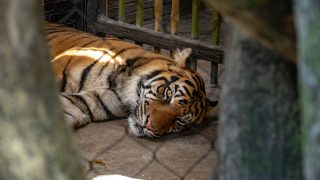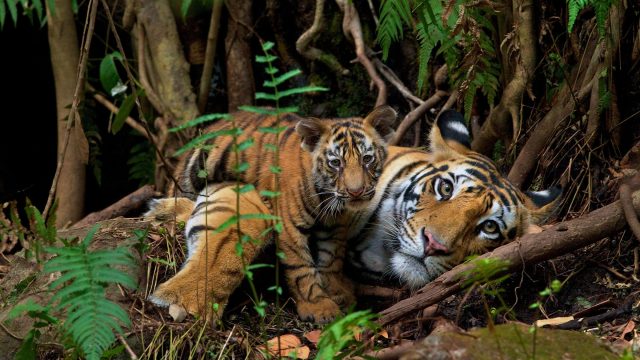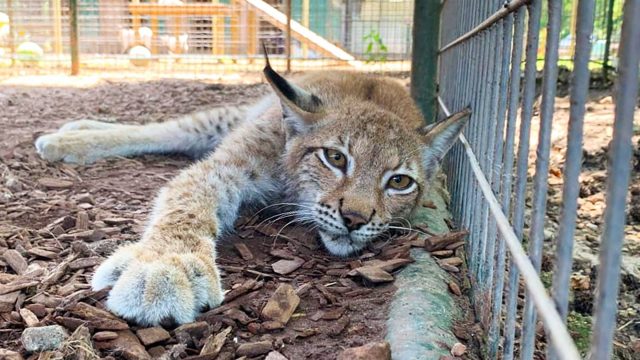
Whether it’s Orcas or Tigers—Captivity is Cruel
By Stephen Wells, Animal Legal Defense Fund Executive Director
The Netflix docuseries ‘Tiger King’ could have been a change agent. Despite the impetus of the 5-year project — finding a big cat in someone’s white van in the heat of summer — a deliberate choice was made not to focus on the tigers at all. Their story remains untold.
It did not highlight the rampant abuse inherent in wildlife trafficking, including continuous breeding to provide cubs as photo props — who are discarded, whether sold or killed, when they become too large and dangerous to turn a profit. And while viewers briefly saw the squalid conditions the animals at Greater Wynnewood Exotic Animal Park endured — barren cages, rancid food, and untrained staff — it provided no context. Instead, it made a folk hero out of a man convicted of murder for hire, nine Endangered Species Act violations, and seven counts of falsifying wildlife records, yet villains out of rescuers — those who take in the abandoned and provide homes when the novelty of a pet tiger wears off.
Tiger King succeeded in capturing the human drama, neatly cataloguing the outrageous twists and turns worthy of a soap opera, but it relegated the animals to mere “extra” status.
What the series did do, eventually — after the memes and novelty began to fade, was leave a void now filled with questions… because regardless of the initial entertainment, there was an underpinning that viewers inherently knew was cruel. Watching a newborn tiger being ripped from their mother through a chain link fence — then yelled at them for crying and locking them alone in a room — was portrayed as normal, but it shouldn’t be normal.
Keeping wild animals in captivity is dangerous. From individuals to large corporations, the desire to contain animals both great and small, and control them requires an arrogance exclusive to humans. The more dangerous the animal, the larger the spectacle.
We have taken control, not asking if we should — simply declaring that we can. We choose which animals will live and die, which we can keep and eat, which we use in laboratories and which will entertain us.
United States: Support the Big Cat Public Safety Act
Urge your federal lawmakers to support legislation that would prohibit the private possession of big cats and make it illegal for exhibitors to allow direct contact with cubs.
From orcas to tigers, not acknowledging animals’ basic rights does not overcome the laws of nature. There can be — and are — real consequences to our hubris (and we are dealing with some of those consequences on a global scale). By the second episode of Tiger King, one of Joe Exotic’s employees loses his arm after reaching into a tiger enclosure. It was eerily similar to the preview attacks Tilikum, an orca held at SeaWorld until his death in 2017, made on multiple trainers before Dawn Brancheau’s life was taken.
Tigers are powerful, deadly animals, not easily contained or subdued. Yet we continue to engage with these animals cavalierly, not only endangering humans but the tigers themselves. Captive tigers routinely escape their cages and flee into the community, leaving law enforcement officials few options other than killing them.
Despite these dangers, the legal landscape for tigers and other big cats in the United States is grim. There are no federal laws regulating big cats, but the Big Cat Public Safety Act — which is currently before Congress, and this week received a star-studded nudge forward led by Blackfish director Gabriela Cowperthwaite — would change that. In the absence of meaningful federal laws, the task of regulating the private possession of these animals has been left to the states. The result is a jumble of laws with some states banning possession of big cats entirely while others have no restrictions at all. For example, Florida prohibits the possession of big cats by individuals. Cross the border into Alabama, and it’s a different story. Alabama residents can choose to keep a tiger in their backyard without so much as a permit from the state.
There should be some things you can’t buy — and some of those ‘things’ aren’t ‘things’ at all. They are living, feeling beings who deserve our respect and protection. They are animals who don’t belong in tanks, cages, or in homes — but in their natural habitat. The fact that we have the ability to dominate another species doesn’t mean we should.
Sign Up!
Join the Animal Legal Defense Fund's email list to stay up to date on lawsuits, legislation, and regulations affecting animals.
Related
-
Tentative Settlement Reached in Texas Endangered Species Act Lawsuit
The Animal Legal Defense Fund and National Foundation for Rescued Animals, an animal exhibitor doing business as Tiger Creek Animal Sanctuary, have tentatively reached a settlement, pending the dismissal of the Endangered Species Act lawsuit filed in March 2022.February 28, 2024 Press Release -
Big Cat Public Safety Act Passes the U.S. Senate in Victory for Animals
The bill helps end the rampant abuse of tigers and other big cats in captivity by banning private possessionDecember 6, 2022 Press Release -
After Images of Employee’s Injury from Animal Attack Surface – OSHA Complaint Filed Against Texas Wild Animal Dealer and Roadside Zoo Owner
Graphic images of wound are posted on Tik-Tok by an employee of Gator Park — a facility owned and operated by Jason Clay.April 7, 2022 Press Release




